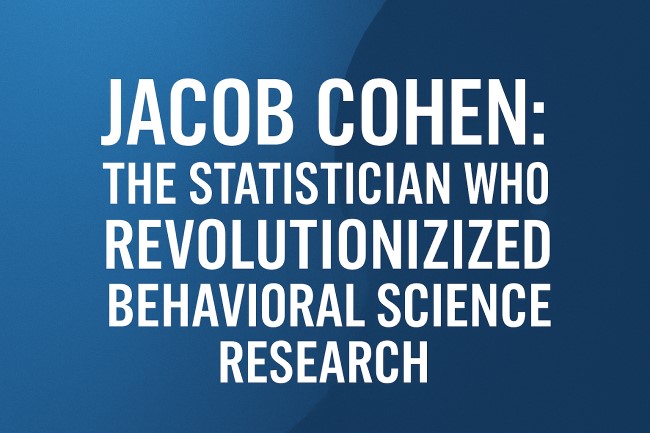Jacob Cohen: The Statistician Who Revolutionized Behavioral Science Research

Introduction to Jacob Cohen’s Legacy
Jacob Cohen was more than just a statistician — he was a trailblazer whose work transformed how researchers design studies, interpret data, and draw conclusions in psychology and beyond. Born in 1923 and leaving a lasting legacy upon his death in 1998, Cohen’s contributions remain the backbone of modern research methodology. His impact spans crucial areas like statistical power, effect size, meta-analysis, and more.
The Rise of a Visionary: Who Was Jacob Cohen?
Academic and Professional Background
Jacob Cohen earned his doctorate in psychology and began teaching and conducting research during a time when statistical rigor in the behavioral sciences was minimal. Realizing this gap, he committed his career to strengthening the statistical tools used in psychology and social science research.
Over the years, Cohen became a prominent figure in academic circles. He held positions at prestigious institutions and published widely-cited works that continue to be referenced today. He was also named a Fellow of major organizations such as:
-
The American Psychological Association (APA)
-
The American Statistical Association (ASA)
-
The American Association for the Advancement of Science (AAAS)
Cohen’s Groundbreaking Contributions
Statistical Power Analysis
One of Jacob Cohen’s most influential contributions was his emphasis on statistical power — the probability that a test will detect an effect when one truly exists.
Why Power Matters
Before Cohen, researchers often neglected the importance of calculating power before conducting studies. Without power analysis, many studies lacked the ability to find significant results even when effects were real, contributing to unreliable conclusions and replication problems. Cohen’s advocacy for a priori power analysis changed that, making it a standard in psychological research.
His Landmark Book
In his landmark 1969 book Statistical Power Analysis for the Behavioral Sciences, and its 1988 revision, Cohen provided practical guidance for researchers to:
-
Choose appropriate sample sizes
-
Interpret null results
-
Increase the validity and reliability of findings
Today, power analysis is a mandatory part of study design across disciplines like psychology, medicine, education, and social science.
Effect Size – Giving Meaning to Statistics
Another major contribution from Jacob Cohen was his development and promotion of effect size metrics, most famously Cohen’s d.
What Is Cohen’s d?
Cohen’s d measures the standardized difference between two means, giving researchers a sense of the magnitude of an effect — not just whether it’s statistically significant. This is crucial because a result can be statistically significant but still trivial in real-world impact.
Cohen also introduced other effect size measures like:
-
Cohen’s f² (for regression analysis)
-
Cohen’s h (for comparing proportions)
These tools help researchers and readers understand the practical significance of research findings.
Meta-Analysis and Research Synthesis
Cohen laid the groundwork for modern meta-analysis, a method that combines the results of multiple studies to identify overall trends.
Combining Data for Stronger Conclusions
By promoting the use of effect sizes across studies, Cohen enabled researchers to aggregate findings more effectively. This has been especially impactful in psychology and education, where individual studies often have small sample sizes.
Reproducibility and Integrity
Cohen’s work has also helped address the replication crisis by encouraging researchers to focus not just on p-values but on reproducible, meaningful effects that can be compared across studies.
Cohen’s Kappa: Agreement Beyond Chance
While Jacob Cohen is best known for statistical power and effect sizes, another crucial innovation is Cohen’s kappa — a measure of inter-rater agreement.
Measuring Human Agreement in Data
Cohen’s kappa is used when two or more raters classify data into categories. Instead of simply calculating the percentage of agreement, kappa adjusts for the agreement that could occur by chance, offering a more accurate representation of consistency.
Applications of Cohen’s kappa include:
-
Clinical diagnostics
-
Content analysis
-
Educational assessments
This measure is now a standard tool in reliability studies and is taught in nearly every statistics course involving categorical data.
Critic of Misused Statistics
Jacob Cohen was also a vocal critic of the null hypothesis significance testing (NHST) model that dominated psychology.
P-Values Aren’t Everything
Cohen argued that over-reliance on p-values led to misleading results, false positives, and neglect of practical importance. He urged the field to:
-
Report effect sizes
-
Conduct power analyses
-
Use confidence intervals
These ideas, once controversial, are now widely accepted as essential to transparent and trustworthy research.
Related Keywords and Topics
Jacob Cohen and Modern Research Practices
Cohen’s legacy extends far beyond his publications. His influence can be seen in:
-
Research design courses worldwide
-
Ethical research practices
-
Open science initiatives
Impact on Behavioral and Social Sciences
Terms like “Jacob Cohen statistical power”, “Jacob Cohen effect size”, and “Cohen’s d psychology” are now standard in research literature, reflecting how deeply his work is woven into the fabric of behavioral sciences.
Lasting Legacy in Academia
His methodologies are widely cited in:
-
Psychology dissertations
-
Public health studies
-
Policy evaluation reports
Jacob Cohen’s insights continue to guide researchers in making science more accurate, transparent, and impactful.
Conclusion: A Lasting Impact on Scientific Research
Jacob Cohen reshaped the way the world thinks about data. By introducing powerful tools like statistical power analysis, effect size metrics, and inter-rater agreement measures, he addressed some of the most critical issues in scientific research. His push for practical significance and statistical rigor has left a lasting mark on psychology, education, medicine, and beyond.



